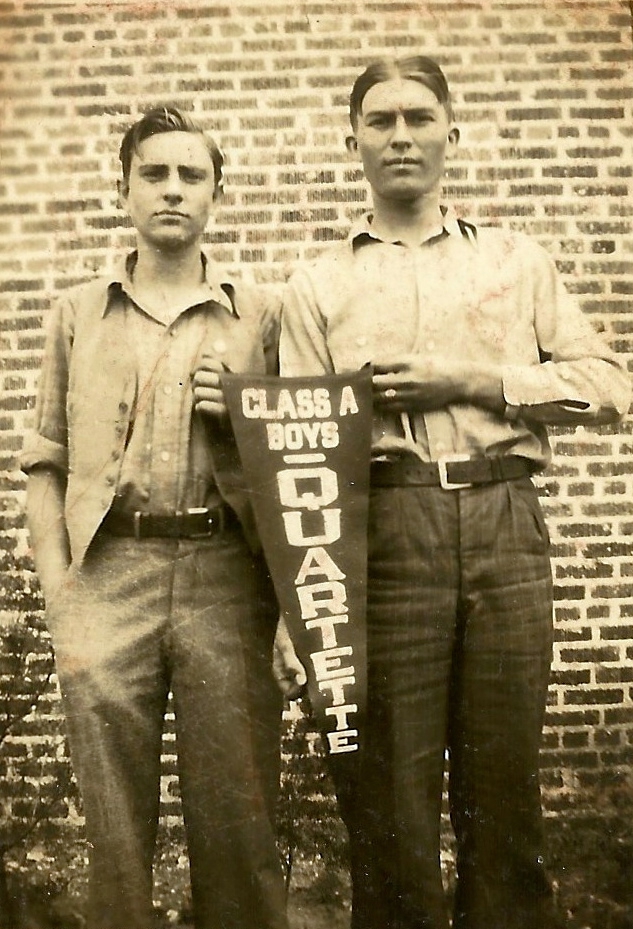
Blogs
Singing
Tuesday, June 3, 2025 by Phyllis Smith Kester
 The young man on the right side of the picture is Buel M. Smith, my father. He graduated from Limestone Gap High School in May 1931, and this picture was likely taken when he was about 16 or 17 years old. He is holding the winning banner after what had first seemed like a catastrophe for four high school teenagers who traveled about the state of Oklahoma singing in quartet competitions. Their small rural high school in southeastern Oklahoma did not have all the things we expect in our schools today. However, at that time, music was important because it was a wholesome activity that brought people joy and made them feel good.
The young man on the right side of the picture is Buel M. Smith, my father. He graduated from Limestone Gap High School in May 1931, and this picture was likely taken when he was about 16 or 17 years old. He is holding the winning banner after what had first seemed like a catastrophe for four high school teenagers who traveled about the state of Oklahoma singing in quartet competitions. Their small rural high school in southeastern Oklahoma did not have all the things we expect in our schools today. However, at that time, music was important because it was a wholesome activity that brought people joy and made them feel good.
The time depicted in this picture marked the beginning of the Great Depression, when public education was severely impacted, particularly in rural areas. However, the small rural schools Buel attended in Oklahoma always had music. Music didn’t require special equipment or specially trained teachers. Students of all ages would sit at their desks and sing together, guided by their teacher.
America had immigrants who brought a musical repertoire that included patriotic songs, hymns, and folk songs. These simple songs were often sung in four-part harmony, sometimes featuring the melody in the second-lowest voice. The most popular songs were “simple” songs with no “high-falutin’ embellishments,” as people desired plain lyrics that anyone could understand and thus appreciate the meaning of what they were hearing.
Although Buel’s farm family might have lacked many things, like indoor running water, an indoor bathroom, electricity, or a telephone, they had a pump organ that their mother played for them to sing at home. Family units were often very musical, and harmonizing was a popular pastime in parts of the South and Midwest, where immensely popular old-time “all-day singings and dinner on the grounds” were held as one of the highlights of the late spring or summer months in many rural areas of America. These events produced three things—good music, good food, and good fellowship. These three pleasures drew people from many miles around to participate in the singings.
The picture above captures an unusual event. Four teenage boys had formed a quartet for singing at community events and contests between schools and regions. Many contests were held around Oklahoma by different schools, and Buel’s quartet often participated. This photo was taken following a quartet contest, in which only three teens could attend because one had become ill. The judges allowed the remaining three boys to continue competing as if they were still a quartet. The picture shows that they won the contest against all odds. They were ecstatic, though it’s not evident from the image. (Perhaps the Great Depression influenced my father’s generation, as they always appeared serious in photographs taken during the late 1920s and 1930s—even during happy occasions.)
Buel’s singing continued after he and Hallie, my mother, married. I remember how we often sang in three-part harmony while traveling in the car on long trips in the 1940s and 1950s. It helped pass the time. When we drove from Oklahoma to California, I was surprised one day when my father started yodeling in one of the songs he and Mother were singing. I couldn’t believe it. I had heard Gene Autry (Oklahoma’s yodeling cowboy) sing and yodel, but my parents had never even indicated they knew how. (Yes, my father’s yodeling sounded like Gene Autry.)
As I quizzed him about his yodeling, my father pointed out that my mother was much better at it. So, we both began insisting that she give it a try. Eventually, she relented. They started their song again, and this time she let loose. I was captivated. It was a side of her I didn’t know existed. She was talented. However, there must have been something special about riding in the car because that was the only place I could ever get her to yodel. I’ve often wondered if my parents honed their yodeling skills during their long drive from Oklahoma to California and back the year before I was born. (To get an idea of how different Hallie sounded from Buel, look online for Melanie Oesch - The Queen of Yodeling. Hallie sounded more like the Swiss yodeler than Gene Autry, although my mother was not nearly as accomplished or fast as the Queen of Yodeling.)
After I left home for college, I discovered my father was back harmonizing with a men’s quartet organized by the mayor of Wichita, Kansas. I thought he was a baritone, but he apparently sang bass with the Wichita group, judging from a handwritten note I recently found in one of my father’s music books. The note was written by the mayor, praising my father for being the best bass singer in Wichita. The mayor also tried to persuade my father to travel the US and other countries with the quartet after retirement; he was tempted but ultimately declined. 
I found it surprising that my father couldn’t read music. He relied on songbooks printed with shaped notes instead of uniform notes. This meant that the head of each note was shaped in one of seven distinct shapes (two different triangles, a diamond, an oval, a square, a quarter circle, and a half circle/baseball cap bill) to indicate its position on the musical scale. It was an old technique that taught the relationship between notes, making harmonizing easier. The whole system seemed complicated to me. However, he could sing any music as long as it had shaped notes. These shaped notes were associated with American sacred music and all-day gatherings, or “singings,” during the era in which he grew up.
As the years sped by, Buel illustrated how following Christ is a matter of the heart, and he demonstrated that his heart was fixed on Christ, who gave him the strength he needed. Even after multiple mini strokes rendered him bedridden and unable to eat or drink in the usual way, he would still joyfully sing those old hymns he had learned over the years. Sometimes I would enter the section of the building where his room was located and hear his rich, mellow voice echoing down the hall in some old hymn with beautiful words.
After Buel’s nursing-home roommate died, the man’s daughter came to us with tearful thanks. She said the Lord used Buel’s songs to lead her father to know Jesus as His Lord and Savior before he died. I silently thanked the Lord for the simple yet clear message in the lyrics of those old hymns. I realized that Buel M. Smith was still joyfully singing to the Lord, despite his own pain and suffering in 1991. Today, whenever I think about fathers, I find it inspiring to know that mine is still “singing unto the Lord”—only in a much larger choir.
I will be glad and rejoice in You; I will sing praise to Your name, O Most High. Psalm 9:2 (NKJV)
Comments
Carolyn Hill From WC B313 At 6/3/2025 8:00:07 AM
Oh, how I love your stories, Phyllis! Your explanation of "shaped notes" is the only one I have come across, and this account of your father's life is fascinating. Thank you fir sharing these memories.Reply by: Phyllis
Thank you for joining me on this trip down memory lane.Previous Posts
Singing
Phyllis Smith Kester
6/3/2025
Dreaming
Phyllis Smith Kester
5/21/2025
Tornado Alley
Phyllis Smith Kester
5/5/2025
Geodes--Part 2
Phyllis Smith Kester
4/23/2025
1940s in Oklahoma
Phyllis Smith Kester
4/8/2025
Buel Overcomes Adversity
Phyllis Smith Kester
3/24/2025
Buel Smith & Pitchers
Phyllis Smith Kester
3/11/2025
Remembering Grandpa Smith
Phyllis Smith Kester
2/26/2025
Meeting Corrie ten Boon
Phyllis Smith Kester
2/10/2025
Walking the Plank
Phyllis Smith Kester
1/28/2025
Train Ride in a Flood
Phyllis Smith Kester
1/13/2025
Saltillo Surprises
Phyllis Smith Kester
1/1/2025
Connecting Two Pictures
Phyllis Smith Kester
12/18/2024
Kintsugi Brokenness & Beauty
Phyllis Smith Kester
12/3/2024
Capillary Action
Phyllis Smith Kester
11/20/2024
A Forge and Anvil
Phyllis Smith Kester
11/5/2024
Tree Analogy #5-Bloom
Phyllis Smith Kester
10/24/2024
Tree Analogy #4: Brokenness
Phyllis Smith Kester
10/9/2024
Israel and Golan Heights
Phyllis Smith Kester
9/25/2024
Tree Analogy #3: Bent Tree
Phyllis Smith Kester
9/11/2024
Lesson From NASA
Phyllis Smith Kester
8/27/2024
Storm Warning
Phyllis Smith Kester
8/14/2024
Tree Analogy #2: Hanging Sod
Phyllis Smith Kester
7/31/2024
Tree Analogy #1: Angel Oak
Phyllis Smith Kester
7/17/2024
The Warning Shot
Phyllis Smith Kester
7/2/2024
Trip's Delayed Surprise
Phyllis Smith Kester
6/18/2024
Antelope Slot Canyon
Phyllis Smith Kester
6/4/2024
The Pioneer Woman
Phyllis Smith Kester
5/21/2024
What is a Woman, a Wife, or a Mother?
Phyllis Smith Kester
5/8/2024
Two Analogies
Phyllis Smith Kester
4/24/2024
Solar Eclipse Analogy
Phyllis Smith Kester
4/10/2024
EASTER
Phyllis Kester
3/26/2024
The Resurrection Plant
Phyllis Smith Kester
3/12/2024
Busted on Pikes Peak
Phyllis Smith Kester
2/27/2024
What is Love?
Phyllis Smith Kester
2/13/2024
Looking, But Not Seeing
Phyllis Kester
1/30/2024
Remembering Christmas 2023
Phyllis Kester
1/16/2024
The Potter
Phyllis Kester
1/2/2024
The Tree Ornament
Phyllis Kester
12/19/2023
Cockapoo Kristy
Phyllis Kester
12/6/2023
Surprises & Obsessions
Phyllis Kester
11/21/2023
Breaking Thru
Phyllis Kester
11/7/2023
Eagles
Phyllis Kester
10/24/2023
Facing Fear
Phyllis Kester
10/10/2023
The Bug-Eyed Monster
Phyllis Kester
9/25/2023
The Flash Flood
Phyllis Kester
9/12/2023
David's Library Book
Phyllis Kester
8/29/2023
Object Lesson: The Leaky Bucket
Phyllis Kester
8/16/2023
Turpentine Creek
Phyllis Kester
8/1/2023
The Surprise
Phyllis Kester
7/17/2023
Small Pleasures
Phyllis Kester
7/4/2023
Are Fathers Important?
Phyllis Kester
6/20/2023
Fathers and Father's Day
Phyllis Smith Kester
6/6/2023
Legacies of my mother, Hallie Hays Smith
Phyllis Smith Kester
5/23/2023
Hallie's Handkerchief Holder
Phyllis Kester
5/9/2023
A Voice from the Past
Phyllis Kester
4/25/2023
Object Lesson: The Crystal Paperweight
Phyllis Kester
4/11/2023
Grandma’s Quilting Bee
Phyllis Kester
3/28/2023
Actions have Consequences
Phyllis Kester
3/14/2023
Hungry Baby
Phyllis Kester
2/28/2023
Married to a Texan
Phyllis Kester
2/14/2023
Charley Kester’s Horses
Phyllis Kester
1/31/2023
Persistence In The Dirt
Phyllis Kester
1/17/2023
Object Lesson: Mushrooms in Our Life
Phyllis Kester
1/3/2023
Trip with Unexpected Twists
Phyllis Kester
12/20/2022
Grandma’s Important Legacy
Phyllis Kester
12/6/2022

